Bans on plastic items are not enough and need to be backed by proper education, environmentalist Cami Appelgren told The Malta Independent during an interview.
She explained that while being in favour of banning certain plastic products, doing so without explaining the reasons as to why something is banned to the public and without proper education on the issue could lead to situations of greenwashing. Asked specifically about plastic bottles, she highlighted that she is in favour of them being phased out, but not in favour of overnight bans for the aforementioned reasons. As such, she supports the government’s bottle return scheme as a good first step in the right direction.
During the interview, she also highlighted that people are finally beginning to believe that one person can make a difference for the environment. Around a year ago Appelgren, who is also the founder of the NGO Malta Clean Up, told this newsroom that many would join her in cleaning up the countryside but would, after a number of sessions, feel demotivated. A lot has happened over the past year, and environmental awareness has skyrocketed.
Now, Appelgren says, there is hope and people are starting to see that one person can make a difference.
During an interview with this newsroom, she spoke about deficiencies in the way the Maltese authorities educate the public on recycling and litter, and explained that instead of just telling people how to recycle, they need to better explain why people should recycle.
She also did not rule out running in another election.
Appelgren explains that she will start to take a step back from the scheduled clean ups given that the concept has now really taken off, and move into a more organisational role while also working on new ventures aimed at attracting nature lovers. Through these new ventures, she explains, she will help raise more awareness of environmental protection in the hope of reaching more people to convey her message.
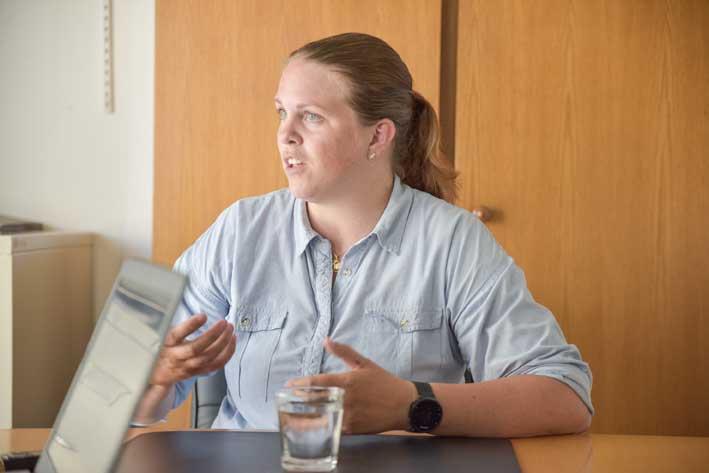
You and a small group of five other people recently used kayaks to travel around Malta in an attempt to raise awareness about marine litter, while also picking up a fair amount throughout the journey. How would you rate the event?
It was a success. We were a very diverse group from different backgrounds. Some of us were very experienced kayakers some weren’t. We met for the first time kayaking just once before the event, so as a team experience it was a success. We all worked as a team.
A lot of people followed us online, more than I would have imagined. In total we had over 100,000 views on the posts. There is litter along Malta’s bays but the issue was that we could not go in with the kayaks everywhere. What we found out at the sea was often small micro-plastics floating around a half metre under the surface. We did pick up what we could see on top of the surface which amounted to a few bags.
What was the most common kind of thrash you picked up while kayaking?
It was mainly material related to the fishing industry. Mostly floats used for lampuki, as well as detergent bottles connected to nylon ropes, plastic bottles and plastic bags.
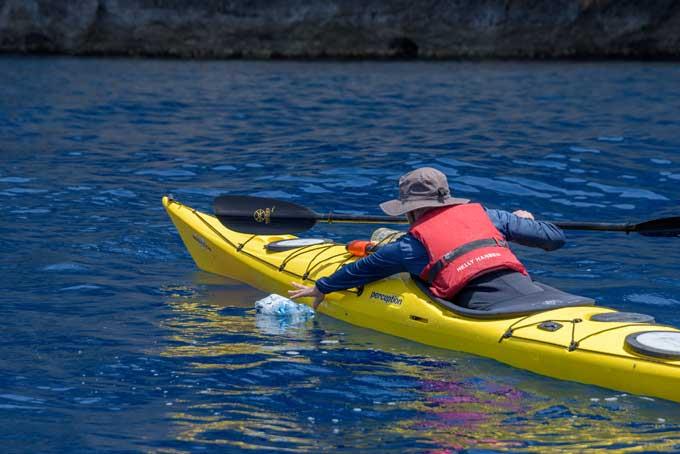
Do you have any other unique events in mind for the future?
There will be more challenges that will require a bit more from the people joining. They create a lot of awareness and people are keener to follow when there is something special going on.
The cleanups are becoming a normal thing now, and I will be taking a step back from the scheduled ones as there are many groups doing them now and you don’t want too many chefs in the kitchen.
I will, of course, still do the impulsive clean up where, if I’m on the beach and see a lot of cigarette butts, I will create videos explaining why they are so bad for the environment. It is time for me to take another step.

What is this next step?
I will go more into a more organisational aspect. The nationwide clean-ups are still there, the ones we have during spring and autumn, aside from the smaller ones. I will also organise more Malta kayaking clean-up events and the next one will most likely see us travelling around Gozo and Comino in one day, or all three islands in two days.
I’m also looking at being more involved in outdoor living promotion, like kayaking, trekking, diving and cycling, to promote public health. The idea is to change the mentality, and if you get people more involved in environmental activities the less likely it is that they would want to litter and pollute. We have people involved in cleanups, which is great, and now we need to reach those who wouldn’t go to cleanups but might go to nature events, and slowly convince them to take better care of the environment.
You had said last year that foreigners would start off being quite enthusiastic when cleaning litter around the island but that many would give up after time. Is that still the case?
There is a growing hope, especially when it comes to the feeling that one person can have an impact.
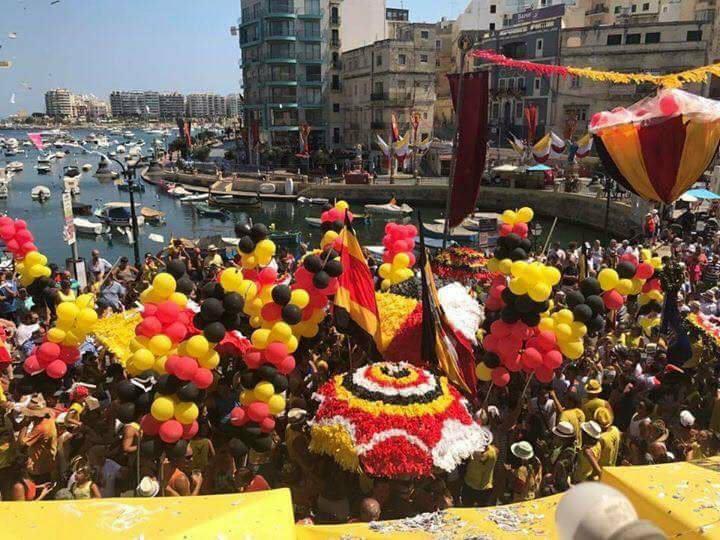
Recently 39 local councils agreed to stop using balloons and plastic confetti. What do you think of this and what do you make of only 39 councils signing it?
This pledge is from last year and does not actually ban anything. It is more of a guideline for them to have alternatives to give people who approach them, but local councils do not have the authority to actually ban anything.
When we created this pledge I had been lobbying for two years with all the councils and it is difficult for councils to go against band clubs so the change has to come from within. So the band clubs have to want to make this change rather than have someone tell them to do it.
Government is working on legislation to ban them by 2020...
Yes, but there is nothing set in stone that it will happen and is still in a state of discussion. We still don’t know that this will happen. That is why I am really happy that through social media pressure a couple of band clubs are already starting to create this change now. It’s about civic pride and not having to wait for laws to be enacted in order to do good.

What else is on your radar in terms of harmful items? Plastic bottles?
When it comes to bottles return scheme, the government was talking about it back in 2017 to implement it in 2018, and now the government is looking at 2020. So this was pushed to back by all that time, which is why when it comes to the balloon release ban I’m not sure it will happen by 2020. But the bottle scheme is on its way and I am in favour for it.
Some people advocate for the total removal of plastic bottles from the market, and I believe you are one such person. At a country-wide scale, how could you get people to switch from using plastic bottles? It isn’t doable overnight.
I don’t believe in overnight bans. It needs to be done in a sustainable way. If you ban something outright the psychology behind it will see people work against it. It needs to be done one step at a time. We need to encourage people to reduce their usage, and explain the reasons why we would be doing that, which is something we lack in Malta. We kind of ban things without giving people the reason why we are doing it, and that makes it very hard for people to adapt to the change as they do not really understand the concept behind it.
The government could fund more refill stations to be placed everywhere, and people could use refillable bottles. There could be more schemes for reverse osmosis filters in households... there are a lot of things that can be done. The bottle return scheme will be a start to make people connect waste with worth and help people realise that waste is a resource that will give us money back. That is a very good start that will help slowly change the mentality.
When it comes to plastic bags, a change overnight is doable, but in other countries normally means the introduction of biodegradable bags. In Malta we do not have a facility for any biodegradable material, so that material ends up in the landfill. It needs specific treatment otherwise the material will not biodegrade. We need to be alert when changing from plastics to other materials. So a change here would need to be slow as people will not agree to a total ban where people would need to bring their own bags.
There are ways to do it. In some countries by law supermarkets must have signs explaining the damage to the environment plastic bags cause, which might affect some people, while encouraging the sale of cloth and paper bags.
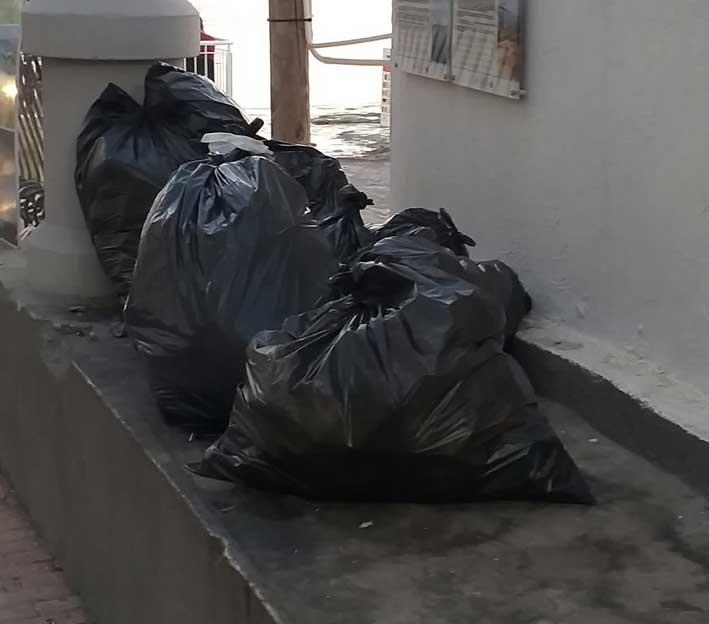
Everyone speaks about educating people. St Paul’s Bay has had major waste problems recently, and a local council representative said: “We are constantly trying to inform people the recycling scheme, but it seems that some people do not wish to learn.” How do you change that mentality?
I would say, and this applies to everyone, that the psychology behind waste management and litter is very badly managed in Malta. They don’t understand how it works. What the government and councils do in Malta is inform the people about what they need to do. Very few tell people why they need to do it. By telling people the why, you involve them, build a community and get neighbours to come together to work for solutions. What most are doing is simply printing a paper, handing it out and believing that this will work. It doesn’t work that way.
There could be thousands of reasons people might litter. They might not be able to read, might be a loner and take out the garbage whenever they want, might not be on social media to see the campaigns etc. the situation needs to be analysed, which takes time and effort.
One thing I don’t agree with, and I’ve heard it quite a lot from government officials, is that people won’t learn. With that mindset, no they won’t learn. If you have a teacher in school with a mindset that his students will never learn, then they will never learn as it will affect his teaching as well.
They need to adapt, analyse their target group, find out why people do what they do, take a step back and see things from a wider perspective which will allow them to find other solutions.
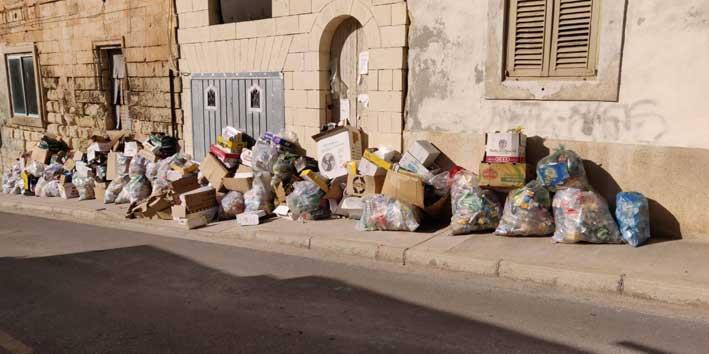
What about the authorities and enforcement. Have you noticed any changes?
There is enforcement. Some feedback I gave to councils was that they need to tell the people that there is enforcement. People are getting fines but you will not see someone bragging that they received a fine on social media. So as long as nobody is mentioning that anyone is getting fined, there will be the view that nobody is getting fined.
Do you think the government needs to make a bigger deal out of enforcement?
Yes. You can’t name and shame. They cannot just make a list saying they fined X amount of people. Instead they should try to turn it into an educational campaign, saying person X got fined for a list of reasons, stating that this is not acceptable because of X reasons. So they would constantly give a wide perspective of the reasons for these fines in an educational way.
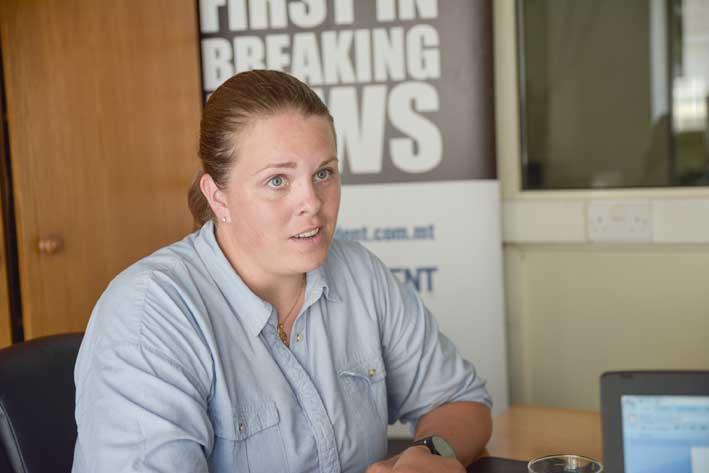
Aside from single-use plastics, what would you say is the number one waste that is really harmful to the environment?
In Malta, we believe that if something is small it doesn’t matter, and this makes the small items more damaging. When someone believes something is small and doesn’t matter, which is then multiplied by millions, then it becomes one of the biggest issues. So I would say cigarette butts.
What could be done about it? Is it a question of placing ashtrays everywhere which could cost a lot, or an educational issue?
We don’t demand that bins be placed everywhere. If someone smokes, they can just as easily but a portable ashtray as they buy a lighter and cigarettes. It belongs to part of the same kit. We need an educational campaign to help people see ashtrays as part of the package.
Many people who don’t smoke get frustrated when smokers put out a cigarette on top of a bin and leave it there, as then the wind takes it out to sea. The issue is that many smokers fear lighting the bin on fire by disposing of it inside. So we need to understand the concept behind why people are leaving cigarette butts there.
We need to understand what smokers are thinking when they throw cigarette butts onto the street. I’ve had quite a number of discussions about people not understanding that it is not organic material, but then someone told me ‘of course they know that there is plastic in the cigarette butts’. So once again they are judging that everyone knows what they know, but I would say that 95% of smokers don’t understand that they are throwing plastic onto the street. It is about education.
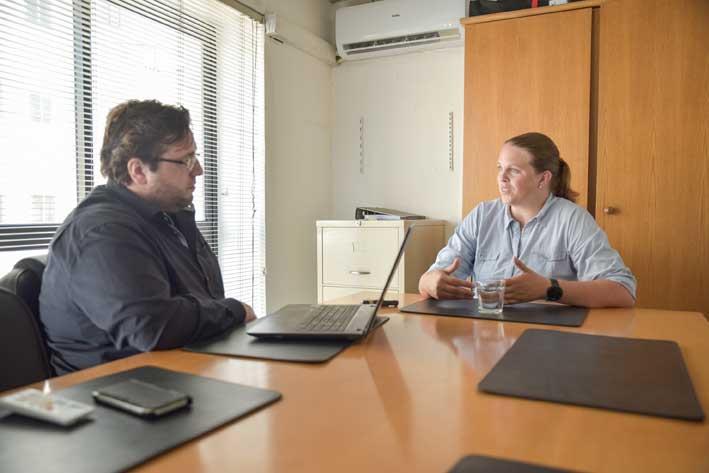
You had a successful run as a first time candidate, receiving over 3,000 first-count votes, also taking into account that you aren’t Maltese. Why did you take a step back from that?
I am not stepping back from being a political person. The term politician in Malta is very narrow. For many it means belonging to a party and having a high position within it. For me being political means that as soon as someone cares for their society, that is a political opinion. So if I believe that the police should earn more, then I am being political. In that sense I have always been and will always be political. As an activist I will always be political and speak up if I see wrongdoings in society for example.
I’ve always seen myself as an activist amongst the politicians and I think that a lot of the votes I received were for me as an activist, as that is how people know me.
Will you ever consider running again?
Possibly yes. I’m not a Maltese citizen so the general election would not be for me, so if I would run again it would be in five years.